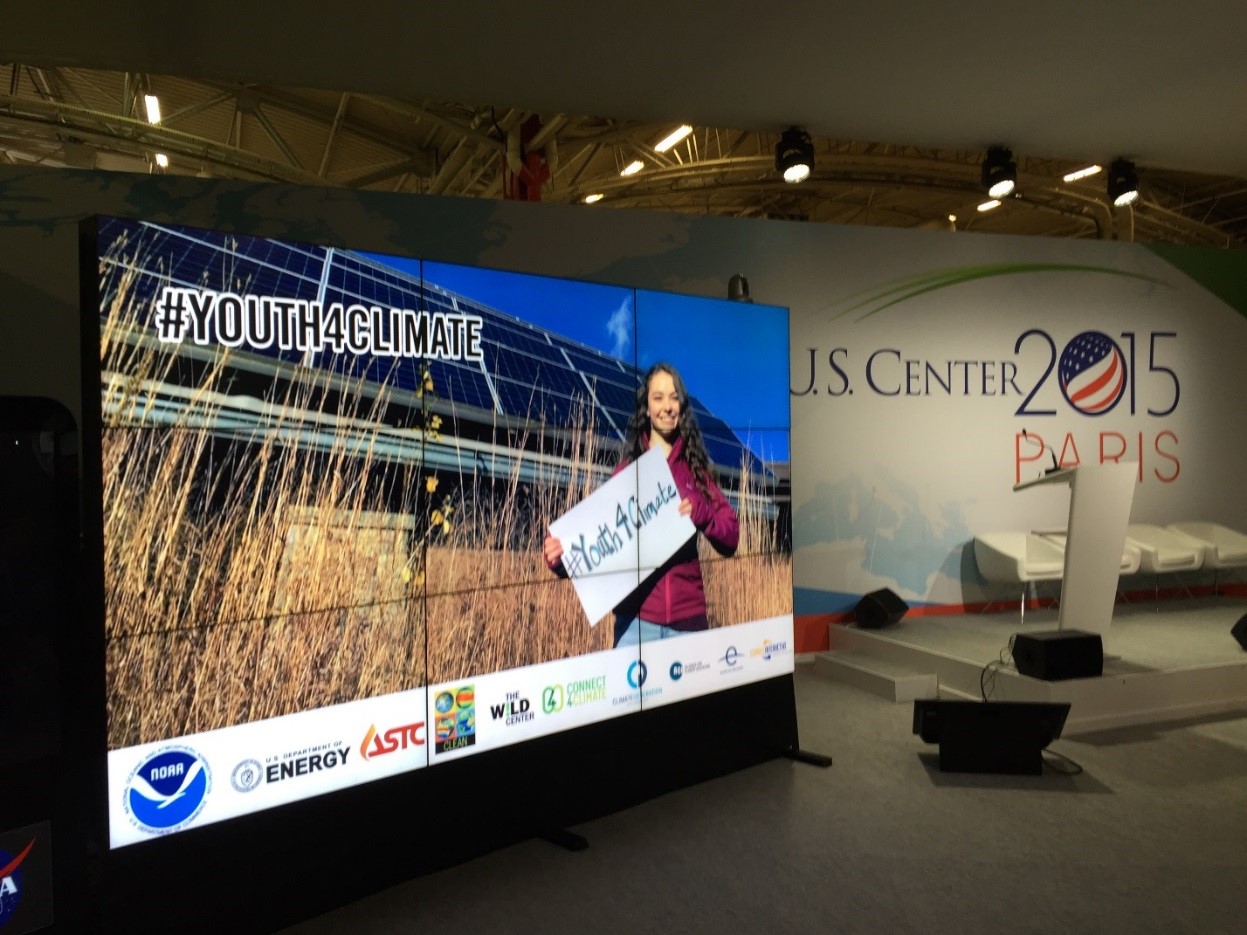
December 3, 2015 marks the one-year anniversary of the Climate Education and Literacy Initiative. This Initiative was launched by the White House Office of Science and Technology Policy (OSTP) to help connect American students and citizens with the best-available, science-based information about climate change by increasing learning opportunities for students, equipping educators with science-based information and resources, enhancing climate-related professional development and training, and engaging citizens through place-based and informal climate education. The Initiative provides a way for leaders across sectors to work together to improve understanding of climate risks and solutions.
It is fitting that this milestone falls during the 21st Conference of the Parties (COP21) to the United Nations Framework Convention on Climate Change in Paris, where representatives of nearly 200 nations are now gathered to find ways to work together on addressing climate change. Climate literacy is a key theme at the COP21 meetings. Earlier this week, the U.S. Center hosted “Our Time to Lead: Youth Engagement on Climate Change,” and today, December 3, the Association of Science-Technology Centers (ASTC) and Universcience will hold an interactive video conference to engage young leaders around the world. Many students and educators from the United States and around the world are at events in Paris, amplifying the need for action back home, and participating through social media, using the hashtags #Youth4Climate and #COP21, bringing their knowledge and enthusiasm to the table.

Ensuring that the outcomes of COP21 are lasting and effective will require the support of a public that understands the fundamentals of the changing climate and what can be done through collective action to mitigate and prepare for climate change. Information and education are empowering, and a climate-smart citizenry can help the United States lead the global transition to a sustainable future.
Participants in the Climate Education and Literacy Initiative have so far included hundreds of educators, students, and engaged citizens. These leaders have reached tens of thousands directly through their work, and countless more through social media and by delivering quality educational resources online and through other channels. Key accomplishments and milestones achieved in support of the Initiative include, among many others:
- Federal agencies have continued to develop their roles as leaders in the education community. The National Oceanic and Atmospheric Administration (NOAA) has collected a number of educational resources, case studies, events, and blogs on Climate.gov. The Department of Energy has expanded the reach of their Energy Literacy framework for teaching. And the National Park Service is working to enhance place-based engagement on climate to better engage the more than 270 million people who visit the 401 National Parks annually. These are just a few of examples of impactful contributions to climate-change education being led by the Federal Government.
- In February 2015, OSTP held a Champions of Change event to honor local leaders who are outstanding climate educators. The event was accompanied by workshops that convened students, classroom educators, and informal and place-based education experts to discuss opportunities and challenges associated with climate education.
- In August 2015, OSTP hosted a Back-to-School Climate Education Event at the White House, bringing together over 150 outstanding students, educators, and leaders from across the country to discuss and demonstrate new and innovative ways to increase climate-learning opportunities.
- The Earth Day Network collaborated with Rovio, the makers of Angry Birds, to develop Angry Birds Champions for Earth, a weeklong global tournament that challenged players to help solve the climate crisis. Champions for Earth debuted at Climate Week in New York City in September 2015 and featured a number of celebrities who shared messages about climate change.
- On November 9, WGBH Boston hosted a National Forum on Climate and Energy Education, supported by a partnership including NOAA. The objectives of the live-streamed Forum were to empower educators to integrate climate information into their instructional methods, to give educational stakeholders in local communities the opportunity to engage with thought leaders in climate education, and to collaborate in the design and implementation of new climate-education solutions. OSTP Director John Holdren delivered remarks at the event.
- On the weekend of October 2, teams at 12 sites across the United States participated in a National Climate Game Jam. This event brought teams of game developers, artists, climate scientists, educators, and youth together to rapidly prototype new games designed to help people better understand, prepare for, and adapt to the effects of a changing climate. Winners were announced on November 30 and have been invited to showcase their games at two public events at the Smithsonian National Museum of Natural History in January 2016.
- As part of their World Climate Project, Climate Interactive has engaged more than 10,000 people in 43 countries as participants in 200 simulated climate negotiations. During these events, participants adopt the role of a global leader and work together to address climate change, raising understanding and awareness of the issue.
The anniversary of the Climate Education and Literacy Initiative is a time to reflect on and celebrate the considerable accomplishments that have been made in climate education over the past 12 months. Efforts aligned with the Initiative will continue to elevate and support the vibrant community of educators and leaders who are dedicated to improving public knowledge and enabling green jobs through education. The more that people know about climate change, the better equipped they will be to implement solutions.
The Climate Education and Literacy Initiative, like all endeavors, is strengthened by diverse individuals and organizations contributing ideas and input. We invite you to join in by learning more about what the Administration is doing to address the threat of climate change, and by sharing your questions, comments, and stories using the hashtag #ActOnClimate.
Laura Petes is Assistant Director for Climate Adaptation and Ecosystems at the White House Office of Science and Technology Policy.
Austin Brown is Senior Policy Analyst at the White House Office of Science and Technology Policy.

